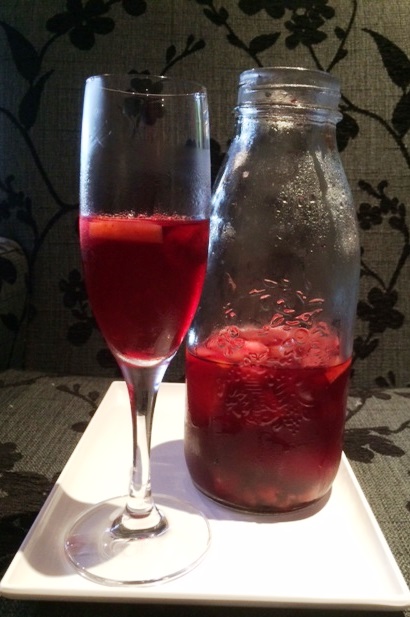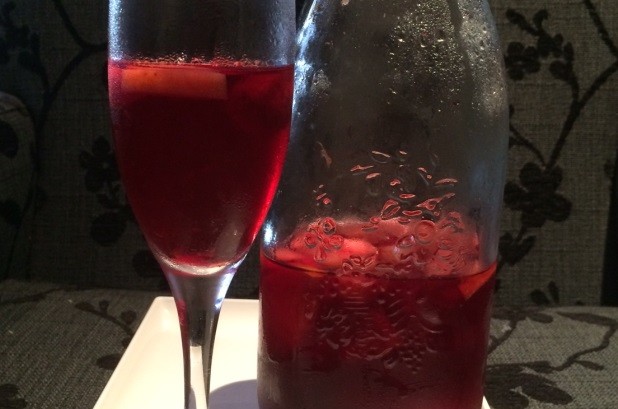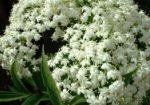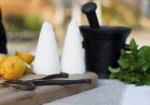All that’s old is new again, including the ‘rediscovery’ of shrubs, or vinegar based beverages.
You may have tried making the raspberry vinegar cordial which we published quite a while back on this blog. Taken from Maria Rundell’s A new system of domestic cookery, 1816, its original title was simply, ‘raspberry vinegar’ or ‘raspberry vinegar water’ in its diluted state. Rundell says:
this is one of the most useful preparations that can be kept in a house, not only affording the most refreshing beverage, but being of singular efficacy in complaints of the chest.
Recent interest in the health giving qualities of vinegar preparations, particularly apple cider vinegar, may have some influence on the current popularity for shrubs. ‘The Curator’ explored West Indian shrubs in our Party like it’s 1799 post on punches, featuring recipes that base shrubs on lime or lemon juice, limes especially, being characteristic of the region. As citrus fruit was a luxury in England, vinegar was substituted, just as vinegar was used in place of lime juice to ‘ceviche’ or preserve fish in an acidic medium.

Rosé shrub. Photo Jacqui Newling © Sydney Living Museums
Wordplay
Most Australians would think a shrub was a small tree, not to be confused with a bush, which can also be a small tree (bush can also refer to a dense growth of shrubs, but that just adds to the confusion). The term shrub as a drink is described in the Macquarie Dictionary (2009), however, as ‘a cordial made of different fruits and sugar, formerly popular’. Popular perhaps, but I’ve found no references to shrubs in colonial texts – perhaps some of our food history devotees know of some? Although a very old English term, it seems that it had disappeared from common usage by the time Australia was colonised in 1788, the common term then being cordial, or occasionally, sherbet, a base for making punch in the early 1800s.
From old world to new
The word originates from the Arabic ‘shurb’, meaning drink, so clearly they share the same roots. Maria Rundell’s lemon sherbet (1816), a version of which we’ve also featured in the past, appears in similar form, 30 odd years later in Eliza Acton’s Modern cookery for private families (1845), undiluted, as ‘portable lemonade’, but no mention of shrub. The recent revival of shrub has stemmed from south-eastern states in America, where British colonists first settled in the 1600s, with the word shrub, apparently.
Sparkling rosé shrub
Ingredients
- 1 orange
- 1 apple
- 1/2 cup raspberries or mixed berries
- 60ml raspberry vinegar cordial concentrate or to taste
- 1 cup cloudy apple juice
- 2 cups rosé wine
- 1 cup ginger beer (optional)
- 2 cups mineral or soda water
Note
Fruit punch, wine ‘cup’, shrub – call it what you will, this makes a refreshing addition to a party. Adjust quantities to your liking, and if you want an alcohol-free version, substitute wine with pomegranate or cranberry juice. If you don't want to make raspberry vinegar cordial from scratch, you can add a teaspoon of sugar dissolved in hot water to purchased raspberry vinegar.
Directions
| Slice the orange and apple into wedges, discarding seeds and core, and slice each wedge across into triangular ‘chips’. Place in a jug with the berries, raspberry vinegar cordial, juice, wine and ginger beer (if not using ginger beer, substitute later with extra mineral water). Stir with the handle of a long spoon and allow to infuse for an hour or two. Add mineral water just before serving to preserve the sparkle. | |
Source
Maria Rundell, A new system of domestic cookery, facsimile of 1816 edition, Persephone Books, London, 2009.

 Print recipe
Print recipe

